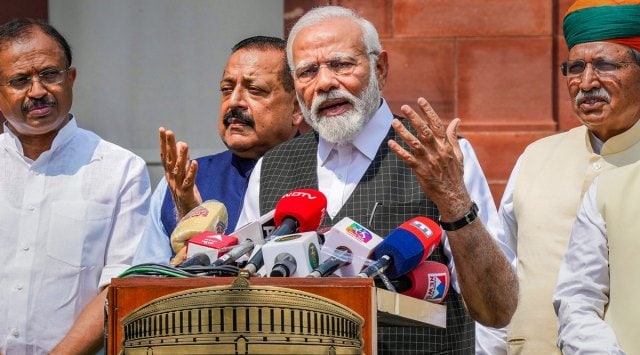
The 21st Law Commission, approved by the BJP government, had in 2018, come to the following conclusion regarding a uniform civil code (UCC): “… diversity of Indian culture must be celebrated, but in the process, specific groups or weaker sections of society must not be dis-privileged. Resolution of this conflict does not mean abolition of all differences. The commission has therefore dealt with laws that are discriminatory rather than providing a uniform civil code, which is neither necessary nor desirable at this stage”.
Merely three years later, does Prime Minister Narendra Modi believe that the socio-political situation in the country has changed enough to impose UCC on the people?
The PM’s strong pitch for a UCC carries the possibility of widening divisions among different classes of people in the country. A uniform civil code will not only affect Muslims and other minority religious groups. It will also impact those within Hindu society given the difference in cultural traditions across states, castes and social strata. For instance, the practices of tribal cultures are entirely different from those of an urban Hindu family.
The condition of minorities remains the same today as it was in 1954 when the first Prime Minister of India, Jawaharlal Nehru, held that the time was not ripe for pushing a common civil code bill. India is a welfare state. This finds expression in the Constitution under the Directive Principles of State Policy. These are aspirational principles that the central and state governments must keep in mind while formulating policies or passing a law. UCC is a part of the Directive Principles of State Policy under Article 44 of the Constitution.
In light of the Supreme Court’s advice, Article 44 vis a vis Articles 25 and 26 (freedom of religion and freedom to manage religious affairs) will become the subject of intense debate. The introduction of a common civil code will come into conflict with Article 25.
Why did the founding fathers of our Constitution complicate matters by not introducing it in independent India? Why was it included under Directive Principles of State Policy, that are not enforceable by any court of law? No doubt, the founding fathers’ approach was pragmatic.
Partition occurred in 1947. Pakistan’s creation was the result of a fear psychosis in the Muslim community of losing their identity in India, given that 80 per cent of the country’s population is Hindu. One-third of the Muslims in pre-Partition India stayed back because they could not relinquish the moral burden of partitioning the country in the face of the implacable hostility of Hindu communalists. Even after 75 years of independence, the hostility of the Hindutva brigade continues. It has been aggravated by the Modi government’s ascension to power in 2014.
In independent India, the question of Muslims organising their community as a political party does not arise. But the fear still exists. What if the majority community takes advantage of its numbers to modify the secularism of the state?
The founding fathers of our Constitution were aware of these apprehensions. This is why they did not impose UCC. They inserted it in part IV of the Constitution as a part of the aims and objectives to be taken up by the state in the governance of the country. And for this, no time frame was set. They believed that Hindus would never allow this country to become a theocratic state since they were secular. With time, they imagined Muslims would quickly change their attitude, political style and ambition. In independent India, the minorities, they believed, would leap out of their shell of isolation and launch into a brave new world, challenging orthodoxy. The majority community would aid the minorities in these efforts. Only then, the minorities themselves would raise the demand to align their personal laws with mainstream secular law and thought. In the founding fathers’ vision, that is when the state would approach the question of a uniform civil code.
Look at the ground reality today. India’s secularism is getting lost in the mires of realpolitik, leaving minorities in a state of insecurity and alienation. Ghettos have become their protective cocoons again. Even the most liberal Muslims are compelled to view themselves through the lens of their religious identity. How is one to forge a new national identity then? The situation has become worse today than it was during and immediately after 1947.
A few years ago, a nine-judge Constitution Bench of the Supreme Court headed by Justice S R Pandian said, “founding fathers of the Constitution could not have countenanced the idea of treating the minorities as second-class citizens. On the contrary, the dominant thinking appears to be that the majority community, Hindus, must be secular and thereby help the minorities to become secular… the majority community should help the minority to realise that its religion and particular social and cultural traits could be safe. The Constitution of India recognised diversity and plurality among the people of India. Under these circumstances, minorities should be helped to come out of the quagmire where they can not be exploited anymore for their insecurity. When they cease to become cannon fodder for political gains, only then there will be no debate or controversy on the introduction of uniform civil court.”
The prime minister is making it seem like the implementation of the UCC is a simple exercise. It seems like he has not gone through the report of the last Law Commission. Having failed in delivering on good governance, the BJP is trying to deploy the UCC to polarise the electorate in order to win the Lok Sabha election in 2024.
The writer is former editor, Dainik Statesman